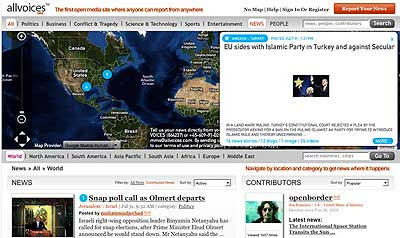Editors from global citizen journalism and opinion sites are looking for contributors from the Middle East. New journalists and writers practice their craft writing for these sites while also getting the reinforcement of seeing something “in print” and reaching wide audiences.
There’s no reason NGOs can’t also become citizen media organizations and make it a part of their mission to post regularly about the issues that they’re devoted to. This can be a major part of a social media strategy for press communications and an efficient way to try to shift coverage of your area from after-the-fact event-based reporting to issues-based reporting that can play a role in preventing volatile situations from coming to a head. Plus, you can make some money (about $4/story in some cases) too!
Essayists and opinion writers (activists and grassroots organizations that don’t have to worry about international brands) should take a look at the “Citizen Voices” section on instablogs where the focus is on building “a Global News network powered by citizens and bloggers all over the world. We intend to give a voice to those unheard conversations, which remain buried due to heavy commercialization of media,” says regional editor Sanwali Sharma. Instablogs wants pieces—long or short—about 2 or 3 times per week for about $4 each. And though $4 isn’t going to pay for your project launch, you and the issues you work on will get exposure. According to Sharma, Instablogs, which officially launched in March 2008, gets 2.5 million pageviews per month.
Similarly, “Global citizen journalism website GroundReport.com is looking for Middle East correspondents…. We think it would be a great way for both us and them to reach out to a wider audience, and all our contributors receive a share of our ad revenue.” Ad revenue? Sounds like more (micro) money to me. Just, if you get an individual to post on your organization’s behalf, make the relationship clear. We don’t want to make online journalists’ jobs any harder by flouting the basic ethics (عربي) of disclosing one’s agenda. For instance, I also keep the blog to which the past two links direct you.
Then there’s the Lebanese citizen journalism site Jaridtak, which encourages all its visitors to become an editor with its big red button. I don’t think any payment is involved, but this didn’t stop one of our recent Web 2.0 seminar participants from posting stories to the site once she found out about it. Then, there’s the new allvoices, where you can report by web, SMS, MMS, and email.
Once you’ve started posting stories, you can email donors, partners, constituents, and, of course, JOURNALISTS the permalinks (permanent web addresses) of the stories and encourage them to subscribe to the RSS feeds and/or to bookmark, promote and share them.
Money. Exposure. Media relations. Conflict and disaster prevention: All with a few words, a picture or two, and a couple of clicks. Yalla.



